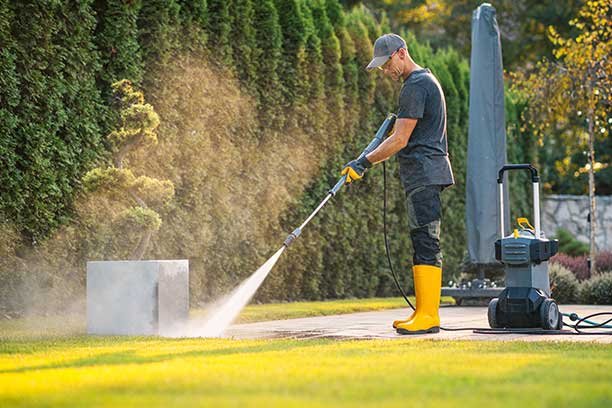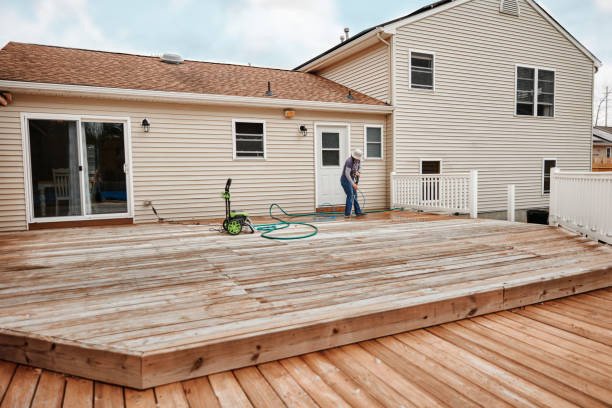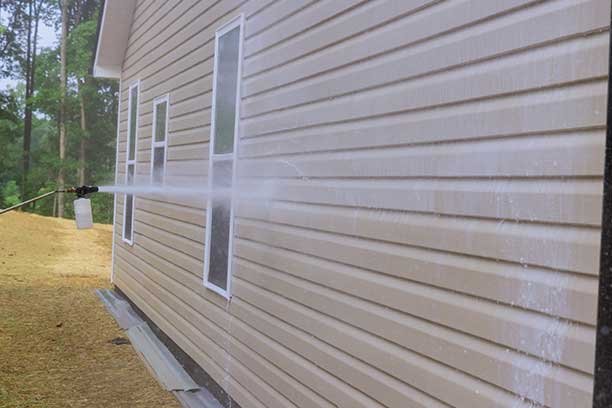
When it comes to cleaning the exterior of your home or business, you may come across two popular options: soft washing vs. pressure washing. Although both methods are good at removing dirt, grime, and mold, they use different techniques to achieve results.
Knowing these differences can help you decide which approach is the best fit for your specific needs.
Soft Washing vs. Pressure Washing: What Is Soft Washing?
Soft washing involves cleaning using a low-pressure water stream accompanied by specialized cleaning solutions. These solutions often contain biodegradable chemicals designed to break down dirt, algae, mold, and mildew without causing any damage to delicate surfaces.
Soft washing is great for surfaces that can’t handle the high impact of traditional pressure washing.
This method is commonly used for roofs, siding, fences, and other materials that might crack or get damaged with too much force. The lower pressure and the inclusion of gentle yet effective cleaning solutions help remove buildup without harming the integrity of the surface.
Soft washing also provides a longer-lasting clean. This is because the chemicals used can kill the spores of algae and mold and prevent them from regrowing quickly.
What Is Pressure Washing?
Pressure washing is also referred to as power washing. This high-pressure cleaning method uses a strong stream of water to blast away dirt, stains, and debris from surfaces. It is highly effective for removing tough dirt and grime on hard, durable surfaces such as concrete, brick, and stone.
Pressure washing is perfect for cleaning driveways, patios, and sidewalks where tough stains like oil, grease, or moss have accumulated.
The high-pressure water stream can be adjusted depending on the surface being cleaned. However, it generally uses a much higher force compared to soft washing. This makes pressure washing particularly effective on surfaces that can handle the intense force without risk of damage.
Knowing the biggest differences between soft washing vs. pressure washing can help you choose the right service for your needs.
Here are the main distinctions to consider:
Pressure Levels
The most noticeable difference between soft washing and pressure washing is the amount of pressure used. Soft washing uses a low-pressure stream of water (typically below 1000 psi) to clean surfaces.
This lower pressure allows the cleaning solution to break down contaminants more gently, which is good for delicate surfaces like roofs and siding.
Pressure washing, on the other hand, uses a high-pressure stream of water (up to 4000 psi) to blast away dirt and debris. This powerful force is highly effective on tough, durable surfaces like concrete and stone, but can be harmful to softer materials.
Cleaning Methods
Soft washing relies on special cleaning solutions that break down dirt, algae, and mold. These solutions are applied using a low-pressure spray, allowing them to soak into surfaces and dissolve contaminants without causing damage.
In contrast, pressure washing uses water alone, relying on the sheer force of the water to scrub away dirt, stains, and debris. Though pressure washing is effective for quickly removing dirt from hard surfaces, it doesn’t always deal with underlying issues like mold or algae.
Surfaces That Can Be Washed
Residential pressure washing is generally better for hard surfaces like driveways, patios, and stone walls. These surfaces can handle the force of high-pressure water without risk of damage. For example, pressure washing can clean a driveway stained with oil or grime effectively.
On the other hand, soft washing is better for more delicate surfaces, such as roof shingles, painted wood, and vinyl siding. These materials can be damaged by high-pressure water, which is why soft washing is preferred.
By using a gentler approach, soft washing protects your home’s exterior while still delivering excellent results.
Effectiveness on Mold and Algae
Pressure washing can effectively clean surfaces, but it may not completely remove mold or algae. The high pressure can push the growth deeper into the pores of the surface, potentially making it more difficult to eliminate in the long term.
Soft washing, however, uses specialized chemicals that can penetrate and kill the roots of mold, algae, and mildew, preventing them from returning quickly.
This makes soft washing a more effective method for long-term prevention, because it tackles both the visible growth and its underlying spores, for a more thorough cleaning process.
Environmental Impact
Because soft washing uses biodegradable chemicals, it is considered an eco-friendlier option. The solutions used are safe for plants, pets, and humans, making it a great choice for homeowners concerned about their environmental impact.
In contrast, pressure washing, while effective, can sometimes result in runoff that carries debris and chemicals away from the cleaned surface.
If cleaning solutions are used in conjunction with high-pressure water, the runoff may contain potentially harmful chemicals that can affect the surrounding landscape and water supply.
Cost and Time
Soft washing usually takes longer than pressure washing because it involves applying the cleaning solution, allowing it to sit, and then rinsing it off. However, this method is often more thorough, because the chemicals used help break down buildup in a way that pressure washing cannot.
This longer process can help guarantee that surfaces are not only clean but also free from contaminants that may cause damage over time.
Pressure washing is faster, especially for large hard surfaces like driveways and patios. It’s a great option for jobs that require immediate results.
However, pressure washing may require more frequent cleanings in the long run. Particularly for areas prone to mold growth, it is less cost-effective for some situations.
Residential Pressure Washing vs. Commercial Pressure Washing
Both residential and commercial pressure washing focus on similar cleaning methods, but the scope and scale of the work can differ greatly.
Residential pressure washing is often used for smaller jobs like cleaning driveways, patios, and roofs. These tasks require careful attention to detail to avoid damaging delicate areas around the home.
On the flip side, commercial pressure washing services are often larger-scale operations, dealing with bigger surfaces like parking lots, building exteriors, or industrial spaces.
Commercial pressure washing in New Jersey, for example, is used for both aesthetic and practical reasons, such as keeping large commercial properties free of dirt, graffiti, and debris.
The pressure settings and equipment used for commercial projects may also differ, because commercial-grade pressure washers are typically more powerful than those used in residential cleaning.
Surfaces That Can Be Washed
When deciding between soft washing and pressure washing, it’s important to consider the types of surfaces you want to clean. Soft washing is appropriate for:
- Roof shingles
- Painted wood surfaces
- Vinyl siding
- Decks
- Fences
These surfaces are more vulnerable to damage from high-pressure water, making soft washing the safer and more effective option.
Pressure washing, on the other hand, works best for:
- Concrete driveways
- Stone walkways
- Patios
- Brick walls
- Sidewalks
Surfaces like these can handle high-pressure water without being damaged, and pressure washing is the most efficient way to clean them.
When to Choose Soft Washing vs. Pressure Washing
The decision between soft washing vs. pressure washing depends on the type of surface you need cleaned and the extent of the buildup. If you’re dealing with delicate materials or areas where mold and algae are a concern, soft washing is the better choice.
However, if you’re looking to clean tough stains on hard surfaces like concrete or brick, pressure washing is more appropriate.
Both methods have their benefits, and in some cases, you may even need to use both. For example, you might use pressure washing to clean your driveway and soft washing to clean the roof or siding of your house.
Knowing the advantages of each method can help you make the best decision for your property.
The Benefits of Professional Pressure Washing
Whether you choose soft washing or pressure washing, working with a professional cleaning service provides the best results. A professional service will have the proper equipment and knowledge to safely and efficiently clean your surfaces.
Pressure washing in New Jersey is offered by numerous companies that can help restore the appearance of your home or business, but hiring a trusted team is the secret to getting the job done right.
A professional pressure washing service will also know which method to use for each type of surface. They can assess your property, determine the best course of action, and clean your surfaces without causing any damage.
By hiring a professional, you’ll save time, avoid costly mistakes, and get the best possible results.
Always Choose Rinse Prince for Your Pressure Washing Needs!
Rinse Prince offers both soft washing and pressure washing services that meet the highest standards. We know that every surface requires a specific approach, and we take the time to assess your property’s needs before we begin cleaning.
Whether you want to boost the appearance of your home or need to maintain a commercial space, our team has the expertise to handle any job.
Our focus on customer satisfaction and commitment to our community distinguishes us from other cleaning services. We believe in the values of respect, integrity, nurturing, service, and excellence, making sure that every project is handled with care and professionalism.
We’re proud to serve home and business owners in New Jersey, delivering outstanding results that last.
If you have any questions about our professional washing services, request a quote today.




